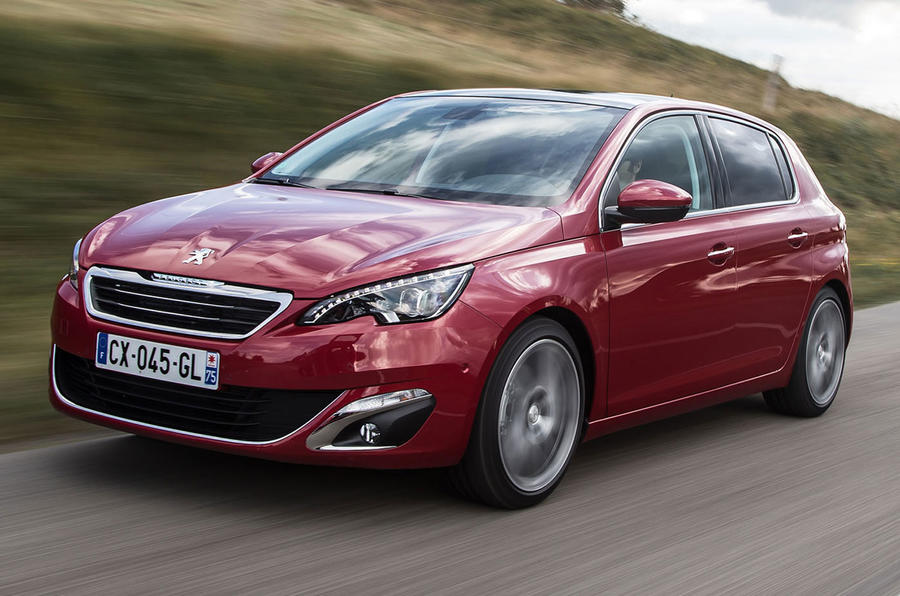Remarkably good. This version of the Peugeot 308 in particular is testament to how much difference can be made to a car’s handling by taking away weight.
The 1.2 e-THP Puretech 130 engine weighs 25kg less than the old 1.6-litre VTi petrol it replaces – and it has an even bigger advantage over Peugeot’s diesel motors, you’d wager.
It also benefits from 30 per cent less internal friction than the VTi. In 128bhp tune it beats Ford’s 1.0-litre Ecoboost triple on both power and torque, as well as even BMW’s 1.5-litre Mini Cooper three-pot on pulling power.
Put that kind of engine into almost any compact car and you’ll improve it. In the 308, you pretty well vindicate Peugeot’s whole dynamic philosophy.
Suddenly that tiddly steering wheel makes better sense, because cornering balance is improved and rate of roll notably reduced. In a heavier-engined 308 it’s all too easy to overwork the front contact patches at speed, flick the car into steady-state understeer, trigger the ESP and make the car’s cornering line unnecessarily untidy.
In this one, both steering response and outright lateral grip are higher – although steering feedback is still disappointingly lacking, making it hard to know exactly when you’re about to add that little bit too much lock.
Peugeot’s new six-speed automatic transmission is a multitalented unit, smooth shifting and intelligent in its timing in ‘D’, and fairly responsive and obedient in manual mode.
Hit the sport button and shift times sharpen slightly, while Peugeot augments the otherwise quiet motor with some artificial aural boost. I could have happily lived without the latter, but it’s not intrusive.
Meantime, the gearbox doesn’t struggle to downshift at high revs, lock up at lower crank speed, or generally do what you ask of it. It really only serves to make a great engine seem even better.



















Add your comment
An owner's view
"The best powertrain in the range can do little about the car’s questionable ergonomics, poor second-row accommodation, mediocre residual values or lack of premium-brand cache, however."
I have had the 6-speed manual Active version since mid-May and fundamentally disagree with this statement. I find the ergonomics a great deal better than those in the Focus and Golf I tested. I always used to hold the steering wheel too low, this one just feels natural and encourages be held correctly. Never again do I want to peer through ever-thicker steering wheels to see the instruments. The Peugeot-Citroën lights/indicator stalk has long been a favourite or mine, far superior to the fifties-style dashboard switches on mainly German models. The rear seat issue is much exaggerated, one doesn't buy a compact hatchback to ferry the England Rugby team around. We have had normal-sized adults in the back and as long as the front seats are not in the extreme aft position there have been no complaints. The more generous luggage capacity is really appreciated, especially since it is not at the expense of a spare wheel. (why is this never mentioned by testers? it is a major issue with most owners I know).
Road tests seem to concentrate on the upper end of the range, which means a stiff price. However the Active spec. ticked all the boxes for me and can be found for less than 16k through the right broker - more sensible 16" wheels mean slightly lower emissions and better fuel economy too.
What is premium brand cache? I'm sure the on-board computers in the 308 have adequate caches too! Incidentally, the latest reliability figures from Warranty Direct place Peugeot well ahead of many of the so-called premium brands, especially the Germans.
Septuple-barrelled
Funnily enough, we don't see the high-end manufacturers doing this, no Rolls royce Phantom GL 650 Supreme Turbo Bastard Scumkiller, is there, methinks these Frenchies are a bit desperate.
Oh for a rallye version.